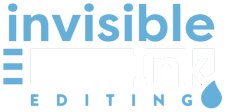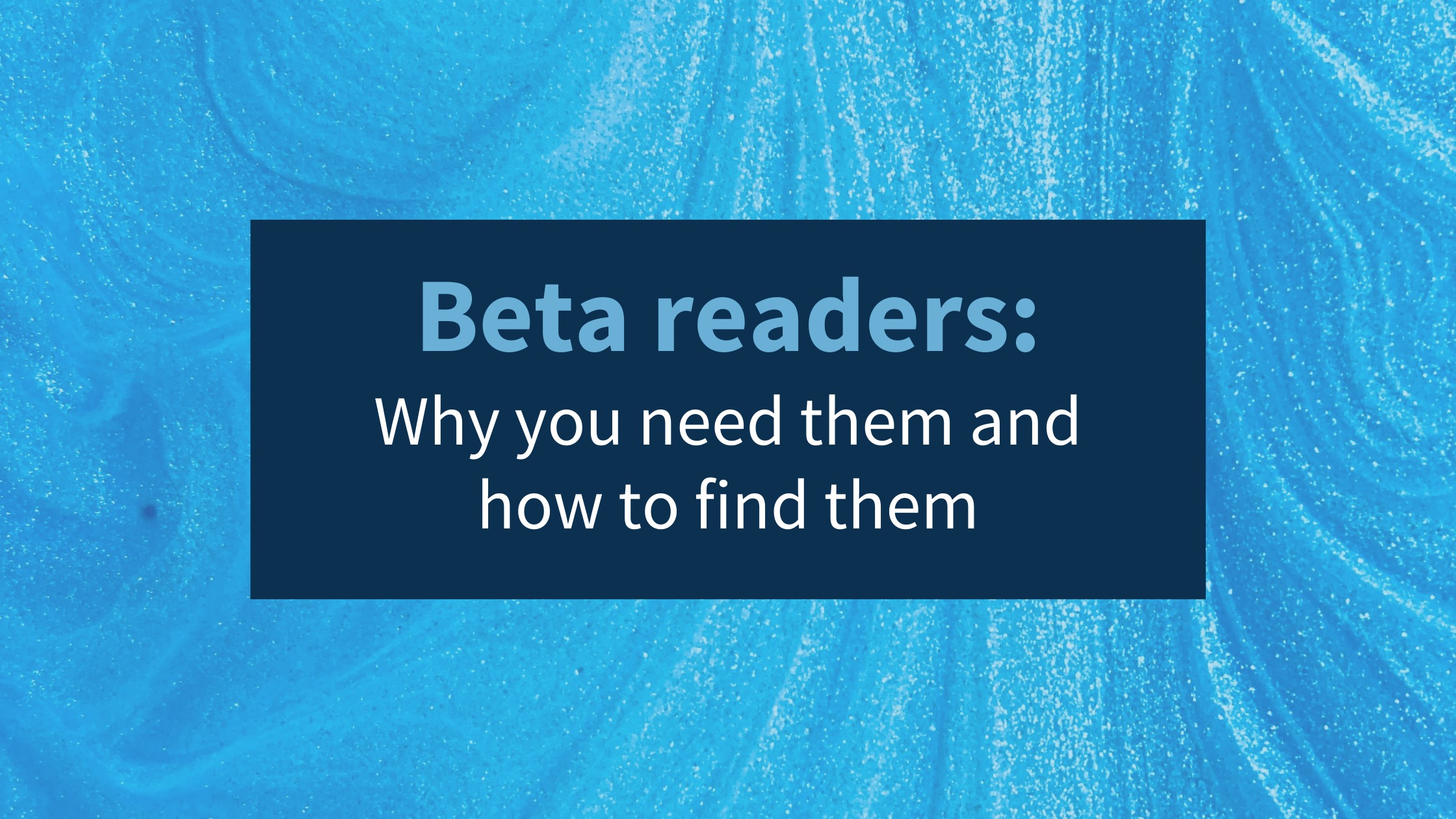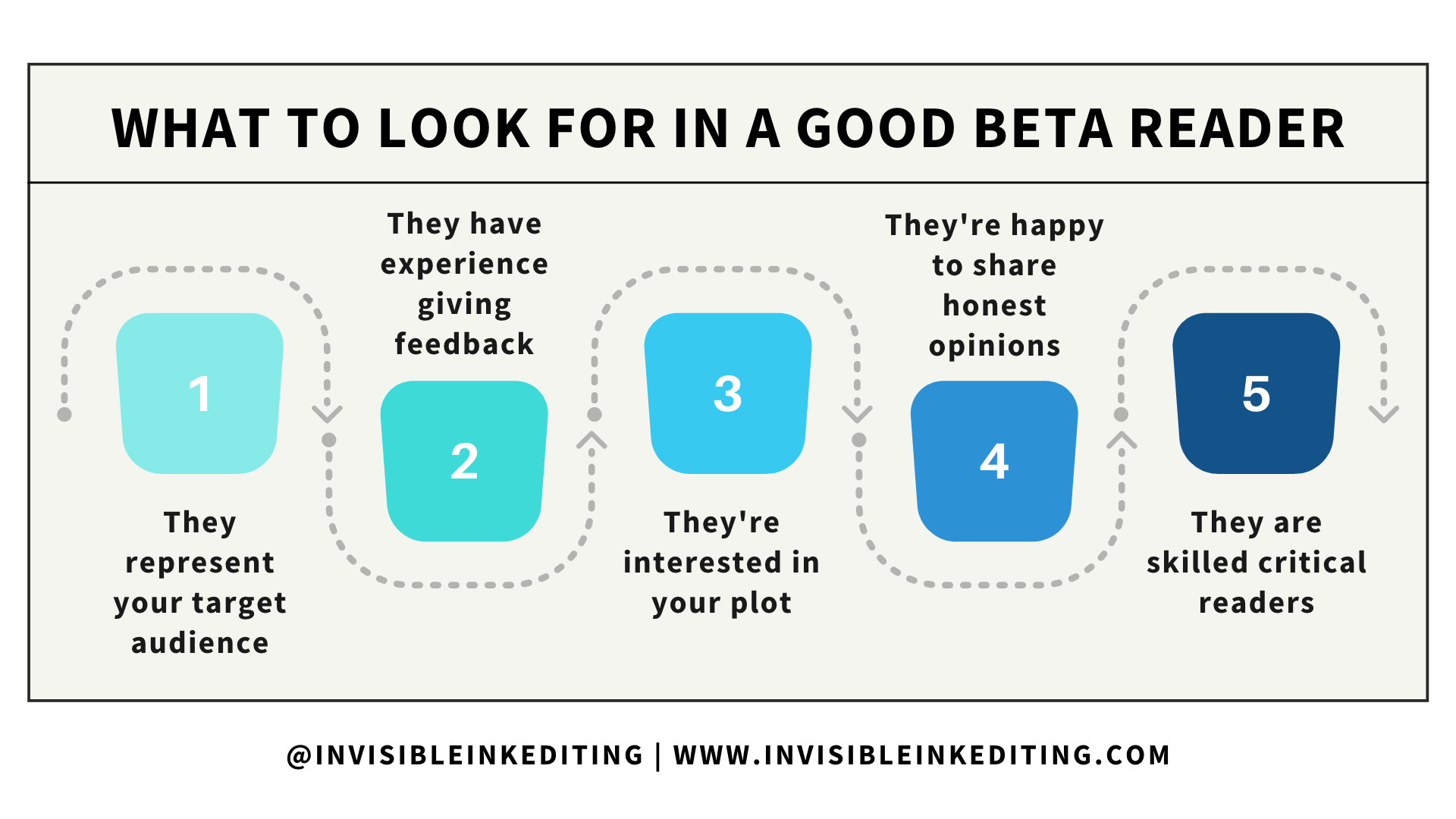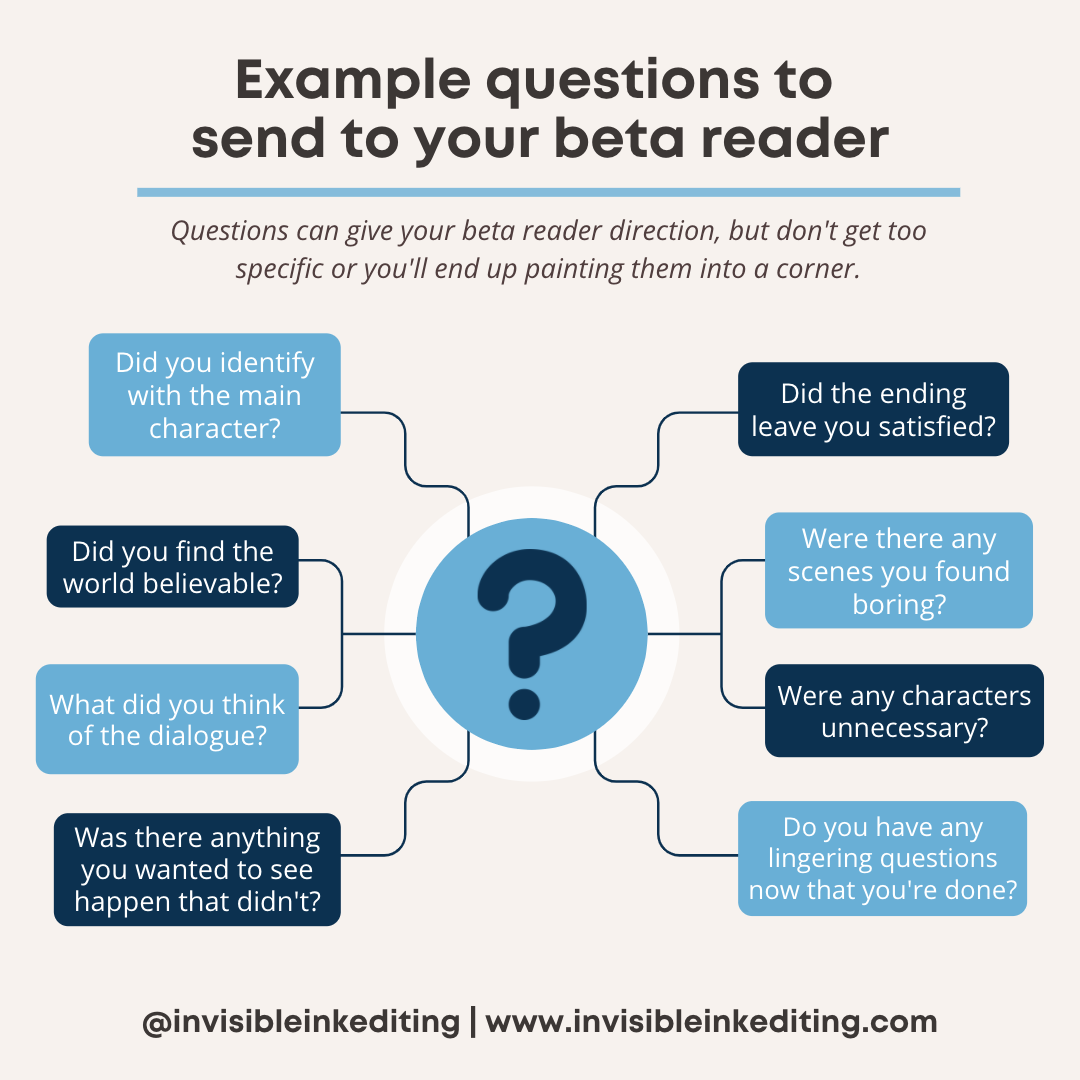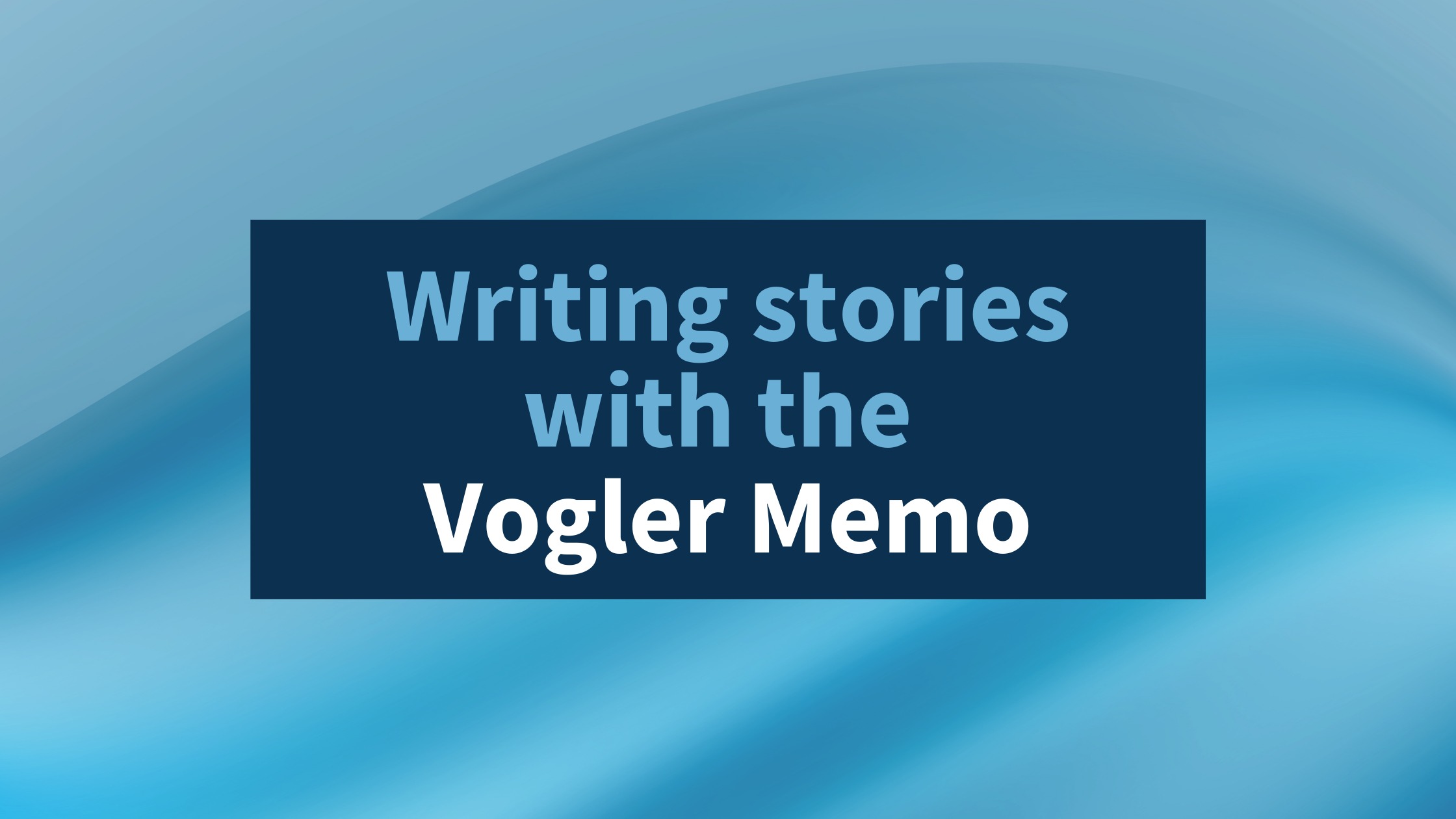Beta readers: Why you need them and how to find them
When you finish the first draft of your novel, it’s easy to start daydreaming about book covers and release parties.
But you’ve got to go through the editing process before you can cross the finish line. You may think the next step is to hire a book editor, but before you spend money on a professional editor, there’s another step you must take: beta reading.
Beta readers are volunteers who will review your manuscript and offer high-level feedback to help shape your next draft and get it ready for a professional editor.
After spending months, if not years, working on your novel, you’ve become intimately familiar with your characters, plot, and other story elements. But that doesn’t mean you’re able to pick up on things like plot holes, repetitive phrasing, shallow characters, or other issues that are harder to see when you’re looking at your own work.
A fresh set of eyes (or many) can give you a different perspective, bring to attention obvious or subtle things you’d maybe want to change, and generally just give you an idea of how others will perceive your book.
What is a beta reader?
Beta readers are people who, you guessed it, read your novel (or parts of it) and give you their opinions. In most cases, they are simply avid readers, not necessarily professional book editors. They’re like a focus group, giving you an idea of any issues you may want to address before publishing your book.
Perhaps the most obvious people to turn to for this task are other writers who are willing to beta read your draft, especially if you do the same for theirs in return. When two writers team up in this way, they’re often referred to as critique partners.
If you’re part of a writing group, you already enjoy the perks of group feedback on your writing. In some cases, you may find beta readers there who simply enjoy the pastime and will jump at the chance to be involved in the development of a new story.
How you work with beta readers is entirely up to you. You may want to provide them with a questionnaire to fill out as they read or ask them a series of questions once they’re done with your draft. Or you can simply have them provide their thoughts on what they did and did not like. You may also find it useful to share pages or chapters as you go, especially if you’re working on a second or third draft and using the same beta readers for each draft.
Asking specific questions can ensure you get the answers you want, especially if there are things you’re concerned about or areas where you know you can improve. But this can allow other issues to slip through the cracks, so be sure to give your beta readers the opportunity to provide their thoughts on things you may not have been looking for. You never know what others will catch that you may not have noticed.
Why do you need beta readers?
As we mentioned earlier, beta readers provide new perspectives to consider as you head into your next draft. You give your manuscript to a handful of people who enjoy or are familiar with the genre and they tell you what they liked and didn’t like—an ending that left them satisfied, believable characters, what they wish would have happened, what they were confused about … the list goes on and on.
Beta readers also give you a glimpse into how readers will receive your book, highlighting any issues you may want to address before seeking out a professional editor. They won’t read the intentions behind what you wrote because they don’t know them. To them, it doesn’t matter what you’re trying to convey. They simply ingest the words on the page. Beta readers can help you pinpoint those problematic areas, see them from a new angle, and then adjust and enhance them.
It won’t always be negative feedback, of course. Beta readers can also tell you what parts of your novel they liked the most and what they want to see more of. They’ll give you feedback on your tone and style, and whether it’s working for them. All this information is incredibly valuable for the next draft of your manuscript.
What to look for in a good beta reader
Before we get into where to look for your beta readers, let’s talk about what makes a good beta reader.
First of all, a beta reader cannot be a friend, partner, family member, colleague, or anyone else you have a preexisting relationship with. The purpose of a beta reader is to get honest, direct feedback. Though your friends and family may say they are going to give you their honest opinion, their feedback won’t be as deep or rounded as someone who doesn’t know you already.
In an ideal world, a beta reader has most, if not all, of the following qualities:
They represent your target audience
Above all else, the beta readers you choose should represent your audience as a whole. We recommend narrowing your search for beta readers to people who enjoy and understand your specific genre. This ensures that the feedback reflects what your larger, future audience will expect.
They have experience giving feedback
Experienced beta readers know the drill. They give comprehensive, coherent, and honest feedback. If your contenders haven’t been a beta reader before, they should at least be avid readers of your genre or dedicated writers themselves.
They’re interested in your plot
Before you start searching for beta readers, sit down and write out a strong synopsis of your story. You want your beta readers to make it to the last page of your manuscript, and they’re much more likely to do this if they know the basics of your plot before committing.
They’re happy to share honest opinions
Nothing is more frustrating than spending time finding a beta reader only for them to come back with vague or wishy-washy feedback. You want to find readers who will share their thoughts openly, without sugarcoating them or holding back.
They are skilled critical readers
Of course, your beta reader needs to be able to read manuscripts critically. You want detailed, thorough feedback—not someone who simply says they loved it or that it wasn’t as scary/funny/heartwarming as they thought it would be. Look for people who know how to get into the nitty-gritty.
How do you find a good beta reader for your novel?
Now that you understand the value of beta readers and what to look for, where the heck do you find them?
Beta readers typically are not paid for this work—though some are, we’ll get to that—and you can’t just pick any random person off the street. So how do you tap into this wealth of feedback and insight to help you edit your novel and get it ready for a professional book editor?
Local writing groups
Before COVID-19, it was quite common for groups of writers to meet up and exchange work, often in a coffee shop, bar, or classroom. While many of these groups moved online to keep everyone safe during the height of the pandemic, in-person workshops might be starting up again (depending on your area).
Check out the event calendars for your local library or community center, or visit Meetup, Craigslist, or local subreddits to find out if writers are getting back together to discuss and share their writing. If there isn’t one nearby, maybe you can start your own!
Otherwise, there are so many virtual options, you still should be able to find a few good beta readers for your manuscript.
Facebook groups
If you’re a Facebook user, then finding beta readers is as easy as logging in and searching for writing and reading groups.
These forums are filled with people who are just as passionate as you are about writing, your genre, and your subject matter. To help you choose the right group, think about who your ideal readers are and then search for groups related to that topic.
Let’s say, for instance, you’ve just finished the first draft of your zombie apocalypse thriller. Your first move should be to search for fans of zombie books, but you could also look into doomsday prepping groups or fans of dystopian and post-apocalyptic stories.
When you join these groups, be sure to follow their rules. Most groups will regulate who can post, what they can post about, how often, and in what format. Before diving in, take a moment to read all the information about the group and observe how members interact with one another.
Writers forums (including subreddits)
You can find loads of forums and message boards and subreddits dedicated to writing in general as well as by genre. These can be great places to ask for beta readers, but you can’t just create an account, spam the group with requests to read your book, and expect volunteers to come flooding in.
To use these groups properly, you have to participate in these groups and establish a presence. It shows you’re not just there to reap the benefits without offering anything in return. The more you participate, the more people will be more willing to help you out.
The fastest way to offer something of value is to beta read yourself and provide the kinds of honest feedback you expect from others. There is a lot of “you scratch my back, I’ll scratch yours” going on in these groups. Just be sure that if you promise to read something, you follow through—otherwise, you’ll end up developing a bad reputation.
If you’re ready to start looking for beta readers, here are a few places worth exploring:
- Goodreads Beta Reader Group
- Critique Circle
- Critters Speculative Writers Workshop
- Indie Author Group (Facebook)
- My Writers Circle
- r/betareaders (Reddit)
- r/keepwriting (Reddit)
- r/writing (Reddit)
- Writers Carnival
Betareader.io
This website is worth a special mention because it’s an easy way to find beta readers for relatively no cost—or a very low cost. The service allows you to sign up as a writer, a reader, or both. Once you do, you’ll have access to a database of beta readers who are willing to look over your manuscript.
With the free version, you can submit one manuscript and have up to three readers. You’ll be able to track your beta readers as they go, and they can even leave highlights and emojis to let you know their reactions to certain passages.
The upgraded version is still affordable at only $10, and allows you unlimited manuscripts and readers. If you have the budget and plan to write more than one novel, this may be a good option for you.
Should you pay for beta readers?
If you have a solid plot and premise, you should be able to find beta readers at no cost using the methods we mentioned above.
That being said, reading a manuscript or detailed outline is no small task, and providing feedback, whether written notes or a conversation afterward, is even more of a commitment.
If you find a beta reader who goes above and beyond with their feedback, you may want to consider providing a small token of appreciation like a gift card or a signed copy of your book once it’s published.
But if after all that you’re still struggling to find volunteer beta readers or writing partners, you may want to try the following paid beta reading options.
Paid beta reading options
As we mentioned above, Betareader.io has a great free version and an affordable paid version that allows for multiple manuscripts and readers.
There are also sites like Pro Beta Reader, where you can pay a small fee to have a professional beta reader review your work.
You’ll also find beta readers and sensitivity readers for hire on sites like Fiverr and Upwork. These sites allow you to search for people by genre, budget, and other parameters, and you can read reviews from other authors who’ve used them in the past to find the right fit.
What should you ask your beta readers?
You’ll get more mileage out of a beta reader if you give them some direction when you hand over your manuscript. You don’t want to get too specific, as this can paint them into a corner and narrow their perspective. An expansive, outside perspective is what we’re looking for, so do your best not to limit them.
Instead, give them broader, guiding questions to get the wheels turning:
- Did you identify with the main character?
- Did you find the world believable?
- What did you think of the dialogue?
- Was there anything you wanted to see happen that didn’t?
- Did the ending leave you satisfied?
- Were there any scenes you found boring?
- Were any characters unnecessary?
- Do you have any lingering questions now that you’re done?
You have two options when it comes to your list of questions:
- Give them to the beta reader along with the manuscript.
- Wait until they’ve read the book and then hand them over.
The first option allows them to focus more closely on these details as they read. The second option gives them a chance to read without anything in particular in mind. They can then look back and assess how they felt about each topic.
There’s no right or wrong way to go about this, so try each method with different beta readers or different manuscripts. You can also leave the choice up to the beta reader. Would they like questions before they read, or would they prefer to go in blind?
How many beta readers do you need?
You don’t want too many cooks in the kitchen, but no one beta reader can represent the reception of an entire genre of actual readers. Always shoot for at least three beta readers per manuscript for more well-rounded results, and no more than five or six. More than six beta readers and you’ll have too much feedback on your hands, which can easily cross the line from helpful to overwhelming. Three allows for the possibility of concurring opinions, a clear sign that you should keep or reevaluate what your beta readers bring up.
What to do with beta reader feedback
Once you’ve gotten your beta readers’ feedback, read it carefully and determine what you want to change about your manuscript.
Look for feedback your beta readers had in common. Were there any scenes, plotlines, or characters that more than one reader called out? Was it for the same or similar reasons as the other or others?
Reading feedback is never easy. Don’t take anything personally. The important thing is to consider the commentary, be it a concern about a particular character or plot point, or a suggestion for a different direction. Think about why the reader reacted in this way and how making that change could impact the story, good or bad.
If you’re on the fence about whether to take a suggestion, just take it. Make some changes and see how you feel about the outcome. You may even want to reach back out to your beta reader and ask them to read a revised scene.
You can also ask the beta readers to anonymously weigh in on each other’s feedback. Let’s say that Beta Reader A tells you that a certain character should come into the story earlier. You aren’t sure, so you ask Beta Readers B and C whether they think that change would be good. Their opinions can help you decide what to do.
After you’re happy with the draft, it’s time to find a professional editor. Curious to learn more about that process? We’ve got you covered. You can read more about what goes into hiring the right editor here.
Finished with the beta reading process? You can submit your manuscript for a free sample below.
